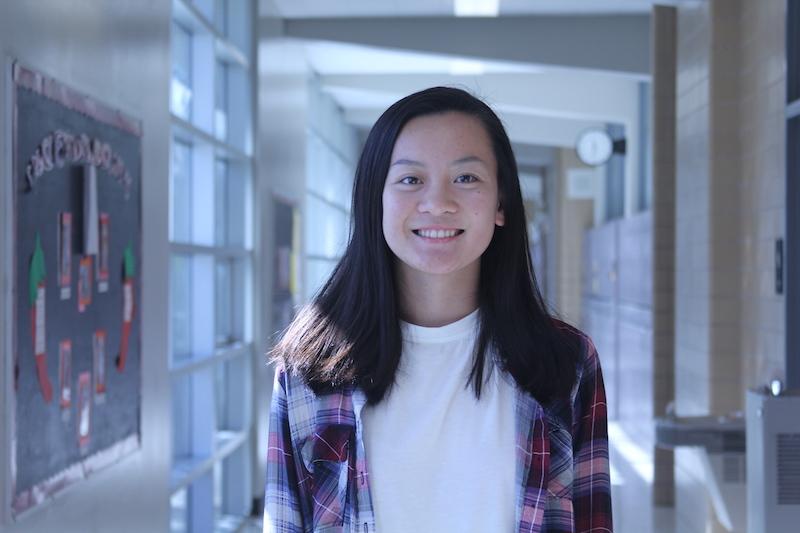Amy Qiang Takes on NaNoWriMo
Sophomore Amy Qiang shares her goals for National Novel Writing Month, and why she likes writing.
November 16, 2016
National Novel Writing Month (NaNoWriMo) is a tradition in which aspiring novelists set forth to complete a story of 50,000 words in thirty days. For her first time, sophomore Amy Qiang is taking on the challenge.
NaNoWriMo began in 1999 in the San Francisco Bay area, starting with only 21 writers. Since then, it has expanded to include 431,626 participants in 2015, with 80,137 of them being educators and students. Over 250 novels written during NaNoWriMo have been published, and well known stories include:
Sara Gruen – “Water for Elephants”
Erin Morgenstern – “The Night Circus”
Hugh Howey – “Wool”
Rainbow Rowell – “Fangirl”
Jason Hough – “The Darwin Elevator”
Marissa Meyer – “Cinder”
Qiang’s appreciation for writing began in elementary school.
“I think it was at least third grade, probably even earlier. I used to do these writing workshops and wrote stories. I wrote stuff in EL (Enhanced Learning). […] I had to write a little story about cobalt and an adventure it had. I think that was what kind of started it. I read a lot too, so reading really inspired my writing,” Qiang said.
Qiang initially heard about NaNoWriMo through Wattpad, a social media account that enables anyone to publish literary works. She read a story an author had written for NaNoWriMo, and was inspired to write her own.
“Overall it [NaNoWriMo] gives you motivation to finish a story. I haven’t finished a story in years- I start so many of them and I can’t finish them- so NaNoWriMo, I feel, is pushing me to finish a story.” Qiang said.
Her plot is partly inspired from a middle school experience.
“The story is based on John* and Sally* from 8th grade when we all thought thought they might start dating. Obviously that’s not going to happen now, but it was cute at the time. So I just took their names and plopped them in the story,” Qiang said.
“John and Sally were childhood best friends. John became famous and he left and Sally was really hurt and upset with him. Then he becomes famous for acting and singing but has some behavioral issues and his manager makes him come back and go to school for some better publicity. He ends up going to Sally’s college because their parents are really close and Sally’s parents recommended this college because it’s a performing arts school and it’s obviously fictional but it’s a really good college supposedly. He comes back and Sally is mad at him and she’s really mean, but she’s nice to everybody else.”
Qiang’s plot, however, wasn’t her first pick.
“The original one [story] I wanted to write was based on how relationships aren’t perfect and how you have to have good communication, but then I was realized my writing is not good enough at this point to do that in order to make it really meaningful. So this one, I think of it as more of a shallow story. It’s a cliche, a romance- you know they’re going to end up together in the end. It’s a cliche for now because I’m just trying to get my writing back up to par,” Qiang said.
Qiang likes writing for a few different reasons.
“It’s a stress reliever and I like living vicariously through characters because I can’t do any of the stuff they do in real life. It makes me feel like I’m living somebody else’s life through my writing, so it’s like an escape.”
Though NaNoWriMo provides great benefits in terms of satisfaction and happiness, it’s far from being an easy task.
“I usually just write when inspiration strikes or when I feel like writing, but that’s a really bad strategy and I need to just start writing even when I don’t feel like it because I can always go back and edit. I just need to sit down every day and write some more. I’m trying to do that, be more consistent with how much I write every day. It’s supposed to be 1700 [a day] words to reach 50,000.” Qiang said.
In addition to offering motivation to finish a novel, NaNoWriMo also provides Write Ins, Broadcasts, Coaches, and Word Sprints to help encourage writers to meet their goals.
“I haven’t really tried any of the forms or live broadcasts they have but I feel like those would be really helpful to motivate people and give writing tips so I’m going to try those sometimes, hopefully.” Qiang said.
As of November 15th, Qiang has written 4036 words.
In the end, Qiang’s endeavor is more about her appreciation for writing and the benefits she gains from it than meeting the daunting goal by November 30th.
“I don’t feel any pressure to finish in time, because I know that if I don’t finish I’ll be disappointed, but it won’t be the end of the world. […] I’m just writing for myself right now, so it’s nice, and a stress reliever because I can get away from school and homework and stuff while I write.”
*Names changed for the sake of privacy



